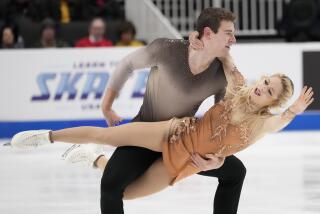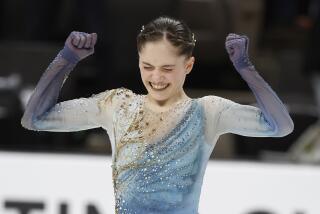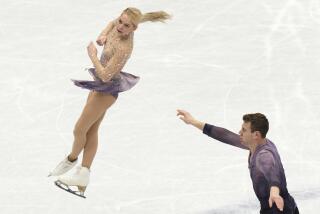For Boitano, Either It’s a Hit or a Miss
- Share via
CINCINNATI — As soon as Brian Boitano had completed his compulsory figures Monday at the World figure skating championships, he began hearing the questions about his quadruple jump.
Usually one of the most accommodating athletes, he begged off.
He talked about the tunnel vision necessary to get through a championship. There are the figures and the short program. Then you think about the long program.
Boitano completed his short program Tuesday night in second place, behind the Soviet Union’s Alexandr Fadeev and just ahead of Canada’s Brian Orser.
They are so close in the standings that the one who is judged to have the best long program tonight at Riverfront Coliseum will win the championship.
For Boitano, the defending champion from Sunnyvale, Calif., it could be determined by whether he cleanly completes the quadruple toe-loop about 1 minute 20 seconds into his program.
No one has ever completed a quadruple jump in competition. Fadeev just missed in the 1984 Winter Olympics at Sarajevo, Yugoslavia. Czechoslovakia’s Jozef Sabovcik missed in the 1986 European championships.
Boitano has missed twice. He came close in the national championships last month at Tacoma but had to touch the ice with his right hand to balance himself.
Only Boitano is expected to try the quadruple tonight.
Fadeev, the 1985 world champion, has the flu and a pulled groin muscle and is just trying to hold himself together.
He had to take the triple axel out of his short program Tuesday night, even though four other skaters had done it before him. It cost him. He finished third in the short program behind Orser and Boitano, holding onto the lead only because of his superb figures Monday.
Orser, second in the 1984 Olympics to American Scott Hamilton and second in the last three world championships, said earlier this week that he might try the quadruple. But when he and Boitano were questioned about it after the short program, Orser said he had never planned to include it in his long program.
“I won’t be doing it,” he said. “Surprise.”
Asked to elaborate, he said: “I don’t think it’s completely necessary. I think the total package is the most important thing, not who does the most tricks.”
Sitting next to Orser, Boitano nodded.
“I agree with Brian,” he said. “It’s the total package.”
But anyone who thought Boitano meant he wouldn’t try the quadruple doesn’t know Boitano. He may not look exactly like Dick Butkus, with the sequins and makeup that all the skaters wear, but Boitano is fearless.
“I’ll use it,” he said. “I’ll do it because I practiced it, and I know I can do it.”
Since Boitano will be the last of the three leaders to skate, he has a tactical advantage. If Fadeev and Orser falter, Boitano has the opportunity to alter his program, making it less difficult so that he will be guaranteed the victory.
He said it doesn’t matter. He’ll still try the quadruple.
“If I didn’t think I could do the quad, I wouldn’t do it,” he said. “But just because I do a quadruple doesn’t mean the judges aren’t going to like Orser’s or Fadeev’s skating better. You just have to do what you do best.
“I laugh when I read the papers, and they make a big deal of the quad. It’s no big deal. If I hit it, I hit it. I’m doing it for myself, not the history books.
“I consider the one I did in Tacoma a quad, even though I came out of it with my hand on the ice. I did it so well.”
In all fairness, Boitano said he considers the quadruple attempted by Fadeev at Sarajevo the first ever completed in competition, although it didn’t count because Fadeev’s left leg grazed the ice on his one-legged landing.
“I know how hard it is to do,” Boitano said.
But Boitano conceded that the skater who attempts the most difficult program might have an advantage with the judges.
“Judges can’t ever see anything that’s too athletic,” Boitano said. “They can see something that’s not athletic enough, like if you try only three triples.”
Besides the quadruple, Boitano is planning at least seven triple jumps. He said he would decide after Wednesday’s practice whether to add an eighth.
Since Hamilton retired after the 1984 world championships, Boitano, 23, has won three straight national championships.
Boitano was able to come from fourth place after the short program last year and win because Fadeev and Orser skated so poorly.
After four straight second-place finishes in World competitions, Orser, 25, believes it’s his turn to win.
“It was a little frustrating last year, only because I didn’t skate my best,” Orser said Monday. “Every time I come in second, I want to win more. So I want to win a lot now.”
If Orser wins tonight, as most skating experts expect, it will give him, Fadeev and Boitano each a World championship entering next February’s Winter Olympics in Calgary.
“That would be kind of fun, actually,” Boitano said. “But I’d prefer to win.”
Sergei Grinkov was not pleased when the coach of his Moscow skating club told him five years ago he had to switch from singles to pairs skating at age 15.
The coach, Stanislav Leonovich, told Grinkov he had the perfect partner for him, 10-year-old Ekaterina Gordeeva.
Leonovich obviously was right because Grinkov, 20, and Gordeeva, 15, won their third straight world championship Wednesday night at the Riverfront Coliseum.
They took the junior pairs championship in 1985 before winning last year in their first seniors competition.
Soviet teammates Elena Valova and Oleg Vasiliev, 1984 Winter Olympic and 1985 World champions, finished second Wednesday night.
Jill Watson and Peter Oppegard from the Los Angeles Figure Skating Club were third, improving over their sixth-place finish of 1986. Because they finished in the top five, the United States will be able to enter three pairs in the 1988 Winter Olympics at Calgary, Canada.
Grinkov and Gordeeva completed a rare quadruple throw, made easier because Gordeeva, at 4 feet 10 inches, weighs only 79 pounds. Grinkov is 5-11, 149.
In the women’s complusory figures Wednesday morning at the Sabin Convention Center, defending champion Debi Thomas of San Jose appeared on her way to taking an overwhelming lead over Katarina Witt, the 1984 Winter Olympic and 1985 World champion.
After the first of three figures, Thomas was first and Witt sixth. But when Thomas faltered on the final figure, she dropped to second, while Witt improved to fifth. Caryn Kadavy of Erie, Pa., was fourth.
The women’s competition continues today with the short program.
More to Read
Go beyond the scoreboard
Get the latest on L.A.'s teams in the daily Sports Report newsletter.
You may occasionally receive promotional content from the Los Angeles Times.






